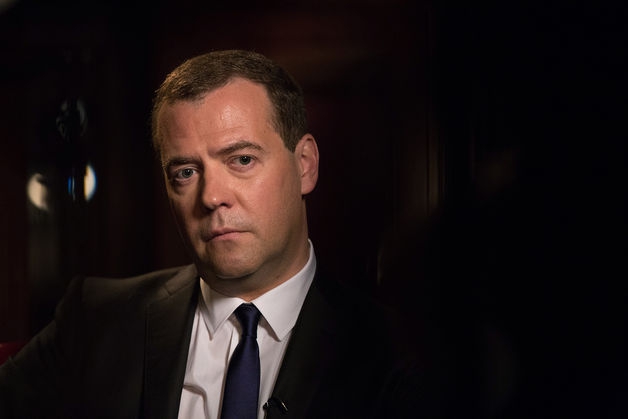 Prime Minister Dmitry Medvedev said the restrictions include all cheese, fish, beef, pork, fruit, vegetables and dairy products.[/caption]
Prime Minister Dmitry Medvedev said the restrictions include all cheese, fish, beef, pork, fruit, vegetables and dairy products.[/caption]Russia slapped import bans on an array of food goods from the U.S. and�Europe, striking back at sanctions over the conflict in Ukraine, where at least three people were killed overnight as separatist fighting rages on.
The restrictions include all cheese, fish, beef, pork, fruit, vegetables and dairy products, Prime Minister Dmitry Medvedev�said today at a cabinet meeting in Moscow. The curbs are targeted at nations that have imposed or supported sanctions against Russia and also include Canada, Australia and Norway.
�It wasn�t easy for us to come up with a response,� said Medvedev, who also announced a ban on Ukrainian planes flying over Russia and a review of the use of Siberian airspace for other airlines. �Even under these conditions I�m sure we�ll be able to turn the situation to our advantage.�
Russia is embroiled in the worst standoff with the U.S. and its allies since the�Cold War�over Ukraine, where government troops are cracking down on pro-Russian insurgent strongholds in the east and Russia�s military is massing thousands of troops across the nearby border. The U.S. and the European Union have targeted Russia�s economy, expanding penalties last week, joined by Canada,�Japan�and�Switzerland, after the downing of a�Malaysian Airline System Bhd. (MAS)�jet in a rebel-controlled area.
 Photographer: Bartek Sadowski/Bloomberg
Photographer: Bartek Sadowski/BloombergWorkers arrange boxes of freshly picked tomatoes inside a greenhouse at a wholesale...Read More
Russia�s Micex Index fell for a third day in Moscow, declining 1.2 percent and extending this year�s drop to 12.3 percent, data compiled by Bloomberg show. The ruble weakened 0.2 percent to 36.2262 per dollar, its lowest level since March, when Putin annexed Ukraine�s Black Sea peninsula of Crimea.
National Interests
Putin has refused to bow to sanctions, aiming with food restrictions �to protect national interests,� according to a decree yesterday on the Kremlin website in which plans for the food band were revealed. He called on the government to boost domestic supplies with the help of producers and retailers and to avoid spurring food-price growth.
�Retaliating against Western companies or countries will deepen Russia�s international isolation, causing further damage to its own economy,� said Laura Lucas, a spokeswoman for U.S. PresidentBarack Obama�s national security council. �We continue to call on Russia to take immediate steps to deescalate the conflict and cease its efforts to destabilize Ukraine.�
Russia imported $43.1 billion of food and raw agricultural materials last year. Of that, $36.9 billion came from countries outside of the former Soviet republics in the�Commonwealth of Independent States, according to Federal Customs Service data. Even before the decree, Russia�s public health regulators banned some imports from EU countries, the U.S. and Ukraine.
Amplify Damage
While the food ban will harm countries supplying food to Russia, �it will likely only amplify the effects of financial and sectoral sanctions imposed on Russia,� Dmitry Polevoy, an economist at ING Bank in Moscow, said in an e-mailed note. �This will likely add to overall sanction costs via higher food inflation and so will have a widespread effect on households.�
Russia�remains at odds with the U.S. and its allies over events on the ground in Ukraine. The U.S. joined NATO and�Poland�in warning about the risk of Russia sending troops into its neighbor, with Russia calling reports of a military buildup on its western border �groundless.� The threat of an incursion is �reality,� U.S. Defense Secretary Chuck Hagel said in�Germany.
Humanitarian �Pretext�
The government in Kiev has estimated that Russia has deployed 45,000 soldiers, 160 tanks and 192 warplanes among other equipment along its border, including soldiers stationed in Crimea. NATO Secretary General Anders Fogh Rasmussen is due to meet with Ukrainian officials in Kiev today after the alliance said there�s a threat of Russian troops crossing the border under the �pretext� of a humanitarian mission.
Russia denies involvement in the Ukrainian conflict.
Fighting between separatists and Ukrainian troops continued in the city of Donetsk, where tens of thousands of the city�s one million people have fled amid civilian deaths, power cuts and water shortages. Artillery was used overnight in two districts, with five people wounded, the city council said on its website.
By Bloomberg
The Iran Project is not responsible for the content of quoted articles.











